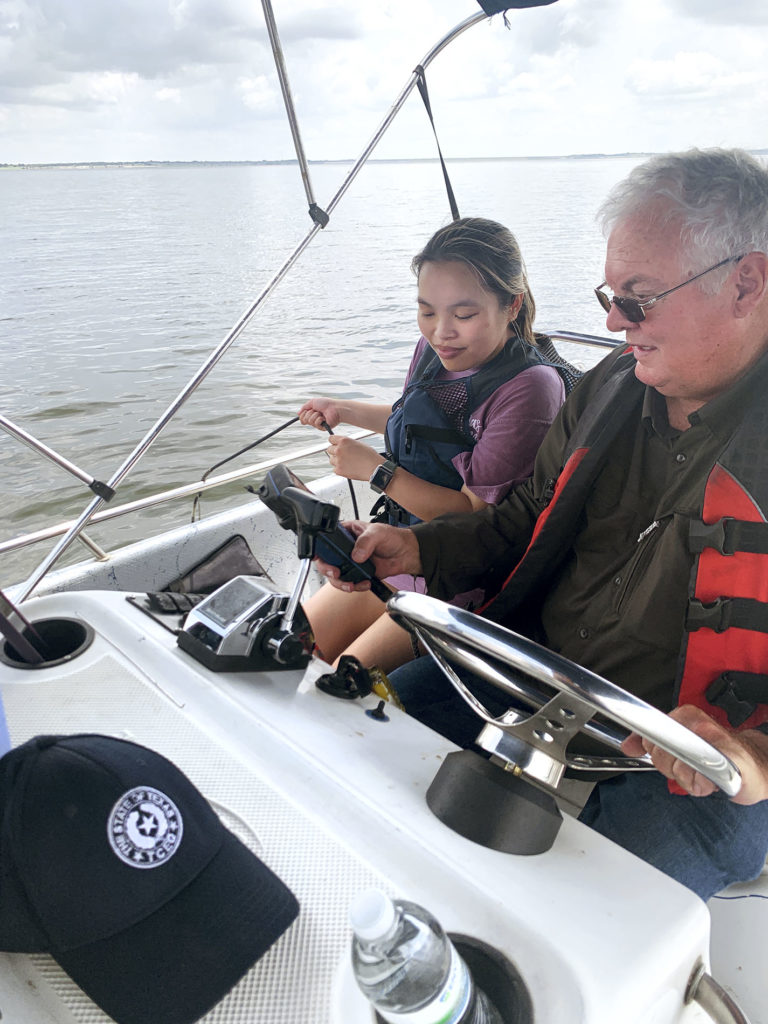Finding solutions for environmental and water issues
Molly McKinney ’23 prepares for career in water management, conservation
Beginning in high school, Molly McKinney ’23 knew she wanted to pursue a water management and conservation career. Her participation in several water conservation programs led the junior environmental studies major from San Antonio to the Texas A&M College of Agriculture and Life Sciences Department of Plant Pathology and Microbiology.

In the department, the Bioenvironmental Sciences Program, BESC, offers two degrees: bioenvironmental sciences and environmental studies. The bioenvironmental sciences degree appeals to students pursuing science-intensive careers in environmental remediation or science-based professional school programs. Students interested in the policy and regulatory aspects of environmental issues often choose to major in environmental studies.
Either major prepares students for career options in the variety of disciplines within environmental science, including environmental consulting, waste management, remediation and environmental policy and law.
“This field of study ensures that future generations have the same standards of water, air quality and waste management we have today,” said McKinney. “I hope to work for either a groundwater conservation district or river authority in Texas.”
A passion for solving environmental issues
In 2017, McKinney was part of the first cohort of high school students in the Texas 4-H Water Ambassadors Program led by the Texas 4-H and Youth Development Program and the Texas A&M AgriLife Extension Service. Each year, up to 30 high school students participate in the 4-H2O Leadership Academy, traveling throughout Texas to learn about water resources, treatment, conservation and management. Other opportunities include education and service activities and connecting with water industry professionals and educators.
“Molly’s application for the program was impressive and made clear her sincere interest in water, natural resources and the water industry,” said David Smith, AgriLife Extension program specialist in the Department of Biological and Agricultural Engineering and coordinator of the program. “In her time as a water ambassador, she was very responsible and productive, providing educational programs in her school.”
Now McKinney works as a student technician for the Texas 4-H Water Ambassadors – where her inspiration for making a difference in managing water resources began.
“I needed a student worker to help organize communications in this growing program,” said Smith. “I knew Molly’s background as a water ambassador would be an asset in communicating with high school students.”
In the past two years, McKinney developed the program’s social media presence, built and maintained the program website and made presentations at retreats for the students. She has been a mentor to another student technician, also a former water ambassador.
McKinney also participated in the San Antonio Water System Impact program. “Every year, student impact teams partner with a San Antonio business, develop a project with them and present it at the Confluence Conference,” said McKinney. “My team partnered with the Mitchell Lake Audubon Center.”
Another program that helped broaden her background in environmental issues was the Texas Brigades. The nonprofit organization, which originated with AgriLife Extension, teaches high school students teambuilding and leadership skills as well as knowledge about wildlife, fisheries and land stewardship.
“I was part of several camps throughout the summer and school year where I participated in educational projects on wildlife management and conservation,” said McKinney. “I focused on quail and cattle, so that was a different angle for me.”
An academic program that helped her flourish
The wide variety of her educational experiences in environmental and water issues influenced McKinney’s choice of where to go to college and what she wanted to study.
“I definitely made the right decision,” said McKinney. “BESC is like an interdisciplinary major. I can choose classes that really interest me. For example, I’m taking a class this semester called Water Issues Facing the U.S. and the World.” She learns about ecology, soil science and environmental regulations and applies those concepts to other courses such as urban planning, architecture and leadership classes.
She has served as the public relations officer and president of the student chapter of the National Association of Environmental Professionals, NAEP. As president, she oversees the operation of the student organization.
McKinney has become a leader and exceptional student in the BESC program, said Kati Stoddard, Ph.D., instructional associate professor and associate department head for undergraduate studies in the Department of Plant Pathology and Microbiology. She is the faculty advisor to the NAEP chapter and has taught McKinney in two courses.
“Molly is driven, focused and very organized,” said Stoddard. “I’ve been impressed with her leadership skills as NAEP president. She knows what she wants and is dedicated to working hard for it. She displays strong professional leadership skills I don’t typically see in students her age.”
The BESC program is designed to develop student success, said Stoddard.
- The curriculum incorporates hands-on experiences that include cutting-edge equipment and technology students will use in their careers.
- The NAEP chapter invites speakers from the environmental industry so students can learn about career options and network with professionals already established in their careers.
- The BESC Professional Board comprises 26 professionals in the environmental field, many who are graduates of the BESC program, and are invested in preparing students for the competitive field they will enter. They advise faculty to help ensure that what students learn is relevant to current and future industry needs. They also identify internships and provide professional development and networking opportunities for the students.
“Networking with the board helped me understand my options within the environmental field and confirm this is the field I want to pursue,” said McKinney. “And, the professors have been wonderful. They want you to learn the subject, apply it, take the information and look at problems differently. They teach you to think, write, speak and collaborate with others.”
Internships build expertise and networking skills

Molly McKinney and Wilson Snyder of the Texas Commission on Environmental Quality conduct water quality tests at Birch Creek State Park. (Photo courtesy of Molly McKinney)
McKinney continues to broaden her knowledge and real-world experience in water management and conservation through internships. She worked for the Headwaters at the Comal in New Braunfels and wrote an educational handbook for in-person or virtual classrooms. She said producing educational materials has been a component of several of her internships and has been gratifying because she not only learns about the topics for herself, but also passes the information on to others.
She was selected for the Mickey Leland Environmental Internship Program, a summer internship program of the Texas Commission on Environmental Quality, TCEQ. She worked in the Critical Infrastructure Division and participated in both virtual and in-person events. The Edwards Aquifer Protection Program hosted a field trip in the Georgetown/Round Rock area to highlight best management practices and site plans used to protect the aquifer. The group toured residential neighborhoods to see some of those site plans in place.
At Birch Creek State Park, she gained hands-on experience in water quality testing from a boat. “We tested several areas of the park,” said McKinney. “We used a water quality meter, tested for turbidity and learned how to fill out forms and submit the water samples.”
The virtual components of the internship were also rewarding. “I was able to network with other students from Hawaii, Guam and all over the U.S. and from different socio-economic groups,” she said. “We worked together and talked about environmental issues, the divisions we worked in and our internship experiences.”
The future looks bright
Before her senior year, McKinney hopes to round out her work experiences with an internship this summer with a private environmental consulting group.
“I think Molly can pursue whatever career in the environmental industry she wants,” said Stoddard. “Through her devotion to her studies in the Bioenvironmental Sciences Program, engagement with co-curricular activities, leadership in the NAEP and her professional experience with the Mickey Leland internship at TCEQ, she is prepared for many options.”
“I know that in anything she sets her mind to, she’s going to be successful,” said Smith. “Through her studies and internships, she has gained a broad knowledge of all facets of the water industry and made many great contacts.”


